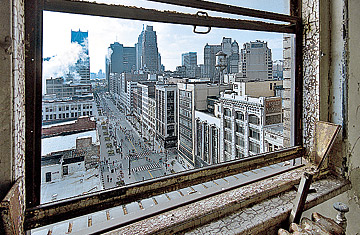
View of downtown Detroit through a window of the Broderick Tower on Woodward Avenue, 2005.
If Detroit had been savaged by a hurricane and submerged by a ravenous flood, we'd know a lot more about it. If drought and carelessness had spread brush fires across the city, we'd see it on the evening news every night. Earthquake, tornadoes, you name it--if natural disaster had devastated the city that was once the living proof of American prosperity, the rest of the country might take notice.
But Detroit, once our fourth largest city, now 11th and slipping rapidly, has had no such luck. Its disaster has long been a slow unwinding that seemed to remove it from the rest of the country. Even the death rattle that in the past year emanated from its signature industry brought more attention to the auto executives than to the people of the city, who had for so long been victimized by their dreadful decision-making.
By any quantifiable standard, the city is on life support. Detroit's treasury is $300 million short of the funds needed to provide the barest municipal services. The school system, which six years ago was compelled by the teachers' union to reject a philanthropist's offer of $200 million to build 15 small, independent charter high schools, is in receivership. The murder rate is soaring, and 7 out of 10 remain unsolved. Three years after Katrina devastated New Orleans, unemployment in that city hit a peak of 11%. In Detroit, the unemployment rate is 28.9%. That's worth spelling out: twenty-eight point nine percent.
If, like me, you're a Detroit native who recently went home to find out what went wrong, your first instinct is to weep. If you live there still, that's not the response you're looking for. Old friends and new acquaintances, people who confront the city's agony every day, told me, "I hope this isn't going to be another article about how terrible things are in Detroit."
It is--and it isn't. That's because the story of Detroit is not simply one of a great city's collapse. It's also about the erosion of the industries that helped build the country we know today. The ultimate fate of Detroit will reveal much about the character of America in the 21st century. If what was once the most prosperous manufacturing city in the nation has been brought to its knees, what does that say about our recent past? And if it can't find a way to get up, what does that say about our future?
My City of Ruins
On my trip to Detroit, I took a long drive around my hometown. Downtown, I visited a lovely new esplanade along the riverfront, two state-of-the-sport stadiums and a classic old hotel restored to modern luxury. In leafy Grosse Pointe, I saw handsome houses anyone would want to live in (and, thanks to the crash of the auto business, available at prices most Americans haven't seen in decades). At the General Motors Technical Center, in the industrial suburb Warren, the parking lots were mostly empty--an awful lot of engineers have been thrown out of work--but the survivors showed me some pretty impressive technology. I liked the cars that "talked" to other cars, making accidents all but impossible, and I was especially impressed by a prototype Chevy fueled entirely by hydrogen. Hydrogen!
